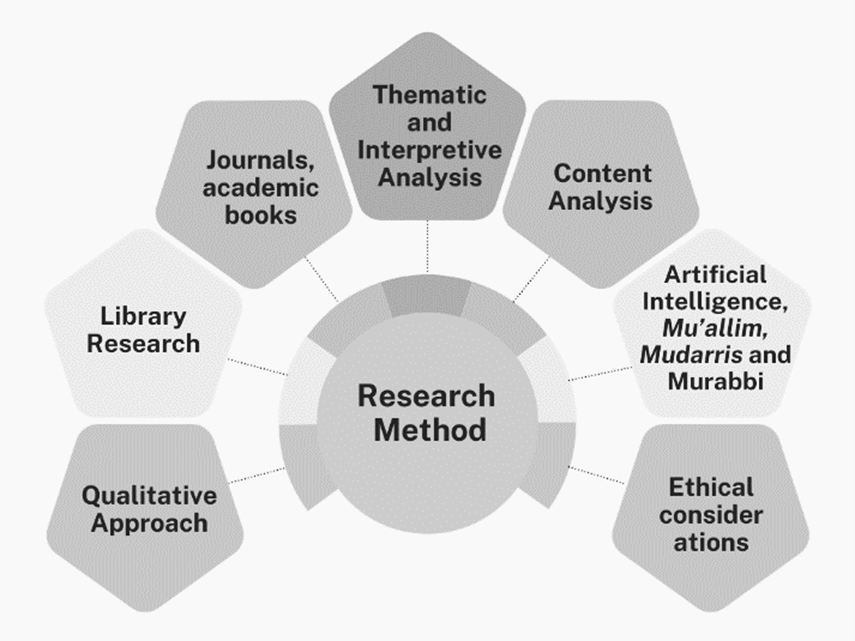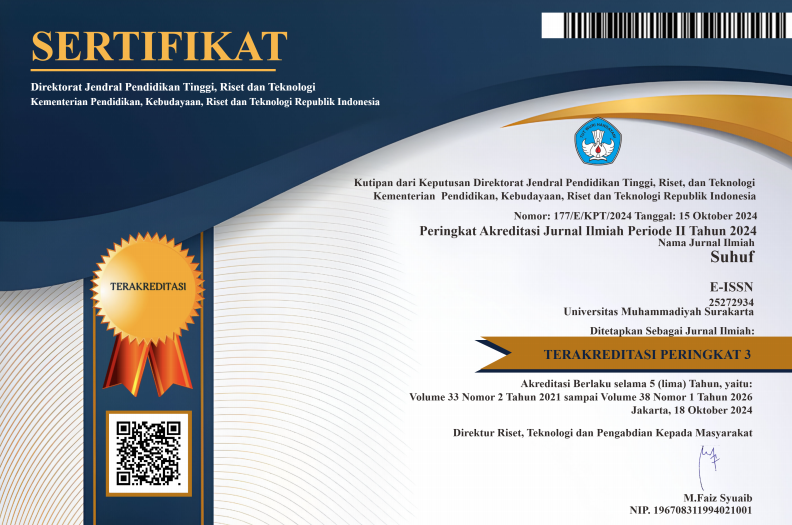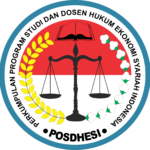How Far Artificial Intelligence influenced Mu'allim, Murabbi, and Mudarris? Transhumanism and Diffusion of Innovation Theory's Perspective
DOI:
https://doi.org/10.23917/suhuf.v36i2.6302Keywords:
Mu’allim, Murabbi, Mudaris, Transhumanism, Diffusion of Innovation TheoryAbstract
The rapid growth of Artificial Intelligence (AI) has begun to change many elements of education, including Islamic religious education. Traditionally, Mu'allim, Murabbi, and Mudarris have played important roles in teaching, ethics, and spiritual guidance. However, little is known about the impact of AI on the shifting existence of these terminologies. This research delves into the impact of AI on the responsibilities and perspectives of Mu'allim, Murabbi, and Mudarris, especially through the lens of transhumanism and the diffusion of innovation theory. This study uses qualitative methods to examine data, exploring the variations in AI integration in Islamic education across diverse cultural and regional backgrounds while also recognizing the specific best practices and challenges in each setting. The research seeks to close the gap in understanding between contemporary technology and Islamic educational customs by examining the evolving responsibilities of educators in the age of artificial intelligence. The findings raise significant issues regarding the preservation of human-centered values in religious education while also highlighting the potential of AI to improve educational methods. This study bridges the gap between traditional educational philosophies and technology breakthroughs, contributing to the increasing body of literature on AI in education and providing insightful information for Islamic studies researchers.
Downloads
References
I. Aisah and H. Permana, "Integrating Professional Teachers in The Transition of The New Habits Through Professional Teacher Competency Training Karawang District," Nazhruna J. Pendidik. Islam, vol. 5, no. 1, pp. 293–301, 2022, doi: https://doi.org/10.31538/nzh.v5i1.2094.
I. F. Kasmar et al., "The Concepts of Mudarris, Mu'allim, Murabbi, Mursyid, Muaddib in Islamic Education," Khalifa J. Islam. Educ., vol. 3, no. 2, pp. 107–125, 2019, [Online]. Available: https://d1wqtxts1xzle7.cloudfront.net/90413609/pdf-libre.pdf?1661780072=&response-content-disposition=inline%3B+filename%3DThe_Concepts_of_Mudarris_Muallim_Murabbi.pdf&Expires=1729586315&Signature=Fb9n6pAZopMGonWZEqM0RRlcQVIPJ7gRUAtm4yOLaoBk0A0kKoBlBGaFKK
A. Mamat and W. N. W. Abdullah, "Konsep Mudarris dalam Amalan Pengajaran Guru Pendidikan Islam Prasekolah [The Concept of Mudarris in the Teaching Practices of Islamic Education Teachers in Preschool]," in Prosiding Kolokium Siswazah Pengajian Islam (KASPI) 2014: Memartabatkan Penyelidikan Pengajian Islam, 2014, pp. 28–37, (in Malaysian). [Online]. Available: http://eprints.unwahas.ac.id/1626/1/Prosiding Seminar Internasional di Malaysia ber ISBN (baca httpmudzakkiraliunwahas.blogspot.co.idpkategori.html).pdf#page=40
M. S. Burdett, "The Religion of Technology: Transhumanism and the Myth of Progress," in Religion and Transhumanism: The Unknown Future of Human Enhancement, London: Bloomsbury Publishing, 2015, pp. 131–147. [Online]. Available: https://www.torrossa.com/en/resources/an/5531161#page=146
H. A. Campbell and G. Evolvi, "Contextualizing Current Digital Religion Research on Emerging Technologies," Hum. Behav. Emerg. Technol., vol. 2, no. 1, pp. 5–17, 2020, doi: https://doi.org/10.1002/hbe2.149.
M. Chassignol, A. Khoroshavin, A. Klimova, and A. Bilyatdinova, "Artificial Intelligence Trends in Education: a Narrative Overview," Procedia Comput. Sci., vol. 136, pp. 16–24, 2018, doi: https://doi.org/10.1016/j.procs.2018.08.233.
M. A. Chaudhry and E. Kazim, "Artificial Intelligence in Education (AIEd): A High-level Academic and Industry Note 2021," AI Ethics, vol. 2, no. 1, pp. 157–165, 2022, doi: https://doi.org/10.1007/s43681-021-00074-z.
L. Chen, P. Chen, and Z. Lin, "Artificial Intelligence in Education: A Review," Ieee Access, vol. 8, no. April, pp. 75264–75278, 2020, doi: https://doi.org/10.1109/ACCESS.2020.2988510.
C. Zhang and Y. Lu, "Study on Artificial Intelligence: The State of the Art and Future Prospects," J. Ind. Inf. Integr., vol. 23, no. September, pp. 1–9, 2021, doi: https://doi.org/10.1016/j.jii.2021.100224.
M. Shidiq, "The Use of Artificial Intelligence-based Chat-gpt and its Challenges for the World of Education: From the Viewpoint of the Development of Creative Writing Skills," in Proceeding of international conference on education, society and humanity, 2023, pp. 353–357. [Online]. Available: https://ejournal.unuja.ac.id/index.php/icesh/article/view/5614
F. Ouyang, L. Zheng, and P. Jiao, "Artificial Intelligence in Online Higher Education: A Systematic Review of Eempirical Research from 2011 to 2020," Educ. Inf. Technol., vol. 27, no. 6, pp. 7893–7925, 2022, [Online]. Available: https://link.springer.com/article/10.1007/s10639-022-10925-9
M. Fahimirad and S. S. Kotamjani, "A Review on Application of Artificial Intelligence in Teaching and Learning in Educational Contexts," Int. J. Learn. Dev., vol. 8, no. 4, pp. 106–118, 2018, doi: https://doi.org/10.5296/ijld.v8i4.14057.
S. N. Khan, "Qualitative Research Method: Grounded Theory," Int. J. Bus. Manag., vol. 9, no. 11, pp. 224–233, 2014, doi: http://dx.doi.org/10.5539/ijbm.v9n11p224.
S. N. Khan, "Qualitative Research Method - Phenomenology," Asian Soc. Sci., vol. 10, no. 21, pp. 298–310, 2014, doi: http://dx.doi.org/10.5539/ass.v10n21p298.
S. Tenny, J. M. Brannan, and G. D. Brannan, Qualitative Study. 2017. [Online]. Available: https://www.ncbi.nlm.nih.gov/books/NBK470395/
K. Nielsen et al., "The Art of Preceptorship: A Qualitative Study," Nurse Educ. Pract., vol. 26, no. September, pp. 39–45, 2017, doi: https://doi.org/10.1016/j.nepr.2017.06.009.
S. R. Shrivastava, P. S. Shrivastava, and J. Ramasamy, "Force Field Analysis: An Effective Tool in Qualitative Research," J. Curr. Res. Sci. Med., vol. 3, no. 2, pp. 139–140, 2017, doi: https://doi.org/10.4103/jcrsm.jcrsm_55_17.
T. L. Haven and D. L. Van Grootel, "Preregistering Qualitative Research," Account. Res., vol. 26, no. 3, pp. 229–244, 2019, doi: https://doi.org/10.1080/08989621.2019.1580147.
S. R. M. Arifin, "Ethical Considerations in Qualitative Study," Int. J. care Sch., vol. 1, no. 2, pp. 30–33, 2018, doi: https://doi.org/10.31436/ijcs.v1i2.82.
D. Winarti and D. Khusnah, "Keistimewaan Pendidikan Islam Dan Tipologi Pendidik Ideal Dalam Al-Quran Dan Hadis [The Uniqueness of Islamic Education and the Typology of the Ideal Educator in the Quran and Hadith]," Piwulang J. Pendidik. Agama Islam, vol. 4, no. 1, pp. 1–23, (In Indonesia), 2021, doi: https://doi.org/10.32478/piwulang.v4i1.671.
M. Masrur, "Figur Kyai dan Pendidikan Karakter di Pondok Pesantren [The Figure of the Kyai and Character Education in Islamic Boarding Schools (Pondok Pesantren)]," Tarb. J. Ilm. Pendidik., vol. 1, no. 01, pp. 272–282, (in Indonesia), 2018, doi: https://doi.org/10.32332/tarbawiyah.v1i01.1022.
M. Shobahiya, "Studi Komparatif Profil Guru Pendidikan Agama Islam Dalam Perspektif Hasan Langgulung Dan Syed Muhammad Naquib Al-Attas [Comparative Study of the Profile of Islamic Religious Education Teachers from the Perspectives of Hasan Langgulung and Syed Muhammad N," Suhuf Int. J. Islam. Stud., vol. 29, no. 1, pp. 38–49, (in Indonesia), 2017, doi: https://doi.org/10.23917/suhuf.v29i1.5086.
W. A. A. W. Abdullah, K. A. Razak, and M. I. Hamzah, "Model Guru Pendidikan Islam Komprehensif [Comprehensive Islamic Education Teacher Model]," Asean Comp. Educ. Res. J. Islam Civiliz., vol. 4, no. 1, pp. 63–74, (in Indonesia), 2021, [Online]. Available: https://spaj.ukm.my/acerj/index.php/acer-j/article/view/64
C. Amelia, A. Aprilianto, D. Supriatna, I. Rusydi, and N. E. Zahari, "The Principal's Role as Education Supervisor in Improving Teacher Professionalism," Nidhomul Haq J. Manaj. Pendidik. Islam, vol. 7, no. 1, pp. 144–155, 2022, doi: https://doi.org/10.31538/ndh.v7i1.2075.
S. Hanafy, "Pemikiran Pendidikan Islam pada Era Kontemporer [Islamic Educational Thought in the Contemporary Era]," Tasamuh J. Stud. Islam, vol. 10, no. 1, pp. 79–91, (in Indonesia), 2018, doi: https://doi.org/10.47945/tasamuh.v10i1.66.
F. Fithriani, "Implementasi Filsafat Pendidikan Terhadap Komponen Pendidikan Islam [The Implementation of Educational Philosophy on the Components of Islamic Education]," Intelektualita, vol. 4, no. 2, pp. 72–86, (in Indonesia), 2018, doi: http://dx.doi.org/10.22373/ji.v4i2.4138.
Y. M. Fauzin, S. Hidayat, and M. A. Muthoifin, "Konsep Guru dan Murid dalam Surat al-Kahfi Ayat 65-78 Perspektif Tafsir at-Thabari dan Tafsir al-Maraghi [The Concept of Teacher and Student in Surah Al-Kahf, Verses 65-78 from the Perspective of Tafsir At-Thabari and Tafsir Al-Maraghi]," Universitas Muhammadiyah Surakarta, 2023. [Online]. Available: http://eprints.ums.ac.id/id/eprint/118971
V. Nita and A. F. As'ad Badar, "Konsep Guru dalam Pandangan Ki Hajar Dewantara dan dari Perspektif Pendidikan Islam [The Concept of Teachers in the View of Ki Hajar Dewantara and from the Perspective of Islamic Education]," Abil. J. Educ. Soc. Anal., vol. 4, no. 1, pp. 170–180, (in Indonesian), 2023, doi: https://doi.org/10.51178/jesa.v4i1.1156.
H. Z. Muchtarom, Filsafat Pendidikan Islam. Jakarta, 1992.
P. Buldan, "Peran Pendidik di Madrasyah Menurut Prespektif Pendidikan Islam [The Role of Educators in Madrasahs According to the Perspective of Islamic Education]," in International Education Conference (IEC) FITK, 2021, pp. 76–83, (in Indoneisan). [Online]. Available: https://proceedings.radenfatah.ac.id/index.php/iec/article/view/12
A. Shafrianto, "Epistemologi Pendidik dalam Pendidikan Islam [The Epistemology of Educators in Islamic Education]," Raudhah Proud To Be Prof. J. Tarb. Islam., vol. 9, no. 1, pp. 218–225, (in Indonesian), 2024, doi: https://doi.org/10.48094/raudhah.v9i1.652.
M. Mustafa, "Filsafat Pendidikan Islam: Telaah Epistimologi Ilmu [Islamic Educational Philosophy: An Epistemological Study of Knowledge]," J. Ilm. Iqra', vol. 3, no. 1, pp. 81–87, (in Indonesian), 2018, doi: https://dx.doi.org/10.30984/jii.v3i1.551.
I. Siregar, "Hakikat Pendidik Menurut Hadis Nabi [The Essence of Educators According to the Hadith of the Prophet]," Khazanah J. Islam. Stud., vol. 1, no. 4, pp. 1–14, (in Indonesian), 2022, [Online]. Available: https://pusdikra-publishing.com/index.php/jelr/article/view/968
M. Maisyaroh, "Hakikat Pendidik dalam Perspektif Falsafah Pendidikan Islami [The Essence of Educators in the Perspective of Islamic Educational Philosophy]," J. Pendidik. Agama Islam Al-Thariqah, vol. 4, no. 2, pp. 1–9, (in Indonesian), 2019, doi: https://doi.org/10.25299/al-thariqah.2019.vol4(2).4079.
E. D. Pulungan, "Hakikat Pendidik dalam Perspektif Filsafat Pendidikan Islam [The Essence of Educators in the Perspective of Islamic Educational Philosophy]," B. Chapter Proc. Journey-Liaison Acad. Soc., vol. 2, no. 1, pp. 62–76, (in Indonesia), 2023, [Online]. Available: https://j-las.lemkomindo.org/index.php/BCoPJ-LAS/article/view/633
K. Iskandar, "Profesionalisme Guru dalam Pendidikan Islam dan Gambaran Ideal Seorang Pendidik [Teacher Professionalism in Islamic Education and the Ideal Image of an Educator]," JALIE J. Appl. Linguist. Islam. Educ., vol. 1, no. 1, pp. 21–40, (in Indonesia), 2017, doi: https://doi.org/10.33754/jalie.v1i1.82.
A. Aziz, "Pendidik Profesional yang Berjiwa Islami [A Professional Educator with an Islamic Spirit]," Pancawahana J. Stud. Islam, vol. 10, no. 1, pp. 56–58, (in Indonesia), 2015, [Online]. Available: https://ejournal.kopertais4.or.id/tapalkuda/index.php/pwahana/article/view/1147
M. S. Amirrudin, "The Qur'an's Ideal Teacher Profile," AT-TAKILLAH J. Pendidik. dan Keislam., vol. 1, no. 1, pp. 12–17, 2023, [Online]. Available: https://jurnal.rahiscendekiaindonesia.co.id/index.php/attakillah/article/view/29
A. Arifuddin, "Konsep Pendidikan Profetik (Melacak Visi Kenabian Dalam Pendidikan) [The Concept of Prophetic Education (Tracing the Prophetic Vision in Education)]," J. MUDARRISUNA Media Kaji. Pendidik. Agama Islam, vol. 9, no. 2, pp. 319–338, (in Indonesia), 2019, doi: http://dx.doi.org/10.22373/jm.v9i2.4782.
A. H. I. Alawi, "Pendidikan Penguatan Karakter Melalui Pembiasaan Akhlak Mulia [Character Strengthening Education Through the Practice of Noble Morals]," Qiro'ah J. Pendidik. Agama Islam, vol. 9, no. 1, pp. 16–29, (in Indonesia), 2019, doi: https://doi.org/10.33511/qiroah.v9n1.16-29.
J. Huxley, "Transhumanism," ETHICS Prog., vol. 6, no. 1, pp. 12–16, 2015, doi: https://doi.org/10.14746/eip.2015.1.2.
J. Cordeiro, "The Boundaries of the Human: From Humanism to Transhumanism," World Futur. Rev., vol. 6, no. 3, pp. 231–239, 2014, doi: https://doi.org/10.1177/1946756714555916.
J. H. Evans, "Faith in Science in Global Perspective: Implications for Transhumanism," Public Underst. Sci., vol. 23, no. 7, pp. 814–832, 2014, doi: https://doi.org/10.1177/0963662514523712.
J. Guerreiro, S. M. C. Loureiro, J. Romero, O. Itani, and S. Eloy, "Transhumanism and Engagement-Facilitating Technologies in Society," J. Promot. Manag., vol. 28, no. 5, pp. 537–558, 2022, doi: https://doi.org/10.1080/10496491.2021.2009615.
R. Ranisch, Post-and Transhumanism: An Introduction. Bern: Peter Lang, 2014. [Online]. Available: https://philpapers.org/rec/RANPAT-15
A. Porter, "Bioethics and Transhumanism," J. Med. Philos., vol. 42, no. 3, pp. 237–260, 2017, doi: https://doi.org/10.1093/jmp/jhx001.
J. Thompson, "Transhumanism: How far is too far?," New Bioeth., vol. 23, no. 2, pp. 165–182, 2017, doi: https://doi.org/10.1080/20502877.2017.1345092.
N. Vita-More, "History of Transhumanism," in The Transhumanism Handbook, Springer, 2019, pp. 49–61. [Online]. Available: https://link.springer.com/chapter/10.1007/978-3-030-16920-6_2
H. Tirosh-Samuelson, "Technologizing Transcendence: A Critique of Transhumanism," in Religion and Human Enhancement, Springer, 2017, pp. 267–283. [Online]. Available: https://link.springer.com/chapter/10.1007/978-3-319-62488-4_16
R. M. Amin, "Guru dalam Perspektif Islam [Teachers in the Islamic Perspective]," Bacaka J. Pendidik. Agama Islam, vol. 1, no. 1, pp. 88–95, (in Indonesia), 2021, [Online]. Available: https://www.ejournal-bacaka.org/index.php/jpai/article/view/24
D. W. Anggraeni, "Kompetensi Kepribadian Guru Menurut Peserta Didik dalam Kitab Ta‘lîmul Muta‘allim karya Syech Az-Zarnuji [The Teacher's Personal Competence According to Students in the Book Ta'lîmul Muta'allim by Shaykh Az-Zarnuji]," Universitas Islam Negeri Maulana Malik Ibrahim, 2019. [Online]. Available: http://etheses.uin-malang.ac.id/id/eprint/14752
I. Askhabi, "Etika Murid Terhadap Guru Menurut Kitab Ta'lim al-Muta'allim Karya Syaikh Az-Zarnuji [The Ethics of Students Toward Teachers According to the Book Ta'lim al-Muta'allim by Shaykh Az-Zarnuji]," IAIN Purwokerto, 2019. [Online]. Available: https://eprints.uinsaizu.ac.id/5226/1/COVER_BAB I_BAB V_DAFTAR PUSTAKA.pdf
N. E. M. Noor, T. S. A. T. Kasim, and Y. M. Yusoff, "Peranan Guru dalam Pelaksanaan E-Pembelajaran Pendidikan Islam Menurut Perspektif Al-Ghazali [The Role of Teachers in the Implementation of E-Learning in Islamic Education According to Al-Ghazali's Perspective]," J. Islam. Educ. Res., vol. 6, pp. 52–63, (in Indonesia), 2021, doi: https://doi.org/10.22452/jier.vol6no2021.4.
Z. M. Nawi, "Peranan Guru Pendidikan Islam dalam Membawa Transformasi Terhadap Mobility Sosial dalam Masyarakat [The Role of Islamic Education Teachers in Bringing Transformation to Social Mobility in Society]," J. Islam dan Masy. Kontemporari, vol. 21, no. 3, pp. 178–188, (in Indonesian), 2020, doi: https://doi.org/10.37231/jimk.2020.21.
R. L. Miller, "Rogers' Innovation Diffusion Theory (1962, 1995)," in Information Seeking Behavior and Technology Adoption: Theories and Trends, IGI Global, 2015, pp. 261–274. doi: https://doi.org/10.4018/978-1-4666-8156-9.ch016.
F. S. Berry and W. D. Berry, "Innovation and Diffusion Models in Policy Research," in Theories of the Policy Process, 4th ed., Routledge, 2018, pp. 253–297. [Online]. Available: https://www.taylorfrancis.com/chapters/edit/10.4324/9780429494284-8/innovation-diffusion-models-policy-research-frances-stokes-berry-william-berry
J. W. Dearing and J. G. Cox, "Diffusion of Innovations Theory, Principles, and Practice," Health Aff., vol. 37, no. 2, pp. 183–190, 2018, doi: https://doi.org/10.1377/hlthaff.2017.1104.
E. Karakaya, A. Hidalgo, and C. Nuur, "Diffusion of Eco-innovations: A Review," Renew. Sustain. Energy Rev., vol. 33, no. May, pp. 392–399, 2014, doi: https://doi.org/10.1016/j.rser.2014.01.083.
E. M. Rogers, A. Singhal, and M. M. Quinlan, "Diffusion of Innovations," in An Integrated Approach to Communication Theory and Research, Routledge, 2014, pp. 432–448. [Online]. Available: https://www.taylorfrancis.com/chapters/edit/10.4324/9780203887011-36/diffusion-innovations-everett-rogers-arvind-singhal-margaret-quinlan
S. L. Vargo, M. A. Akaka, and H. Wieland, "Rethinking the Process of Diffusion in Innovation: A Service-Ecosystems and Institutional Perspective," J. Bus. Res., vol. 116, no. August, pp. 526–534, 2020, doi: https://doi.org/10.1016/j.jbusres.2020.01.038.
G. Zanello, X. Fu, P. Mohnen, and M. Ventresca, "The Creation and Diffusion of Innovation in Developing Countries: A Systematic Literature Review," J. Econ. Surv., vol. 30, no. 5, pp. 884–912, 2016, doi: https://doi.org/10.1111/joes.12126.

Downloads
Submitted
Accepted
Published
How to Cite
Issue
Section
License
Copyright (c) 2024 Titis Thoriquttyas, Nita Rohmawati

This work is licensed under a Creative Commons Attribution 4.0 International License.


















